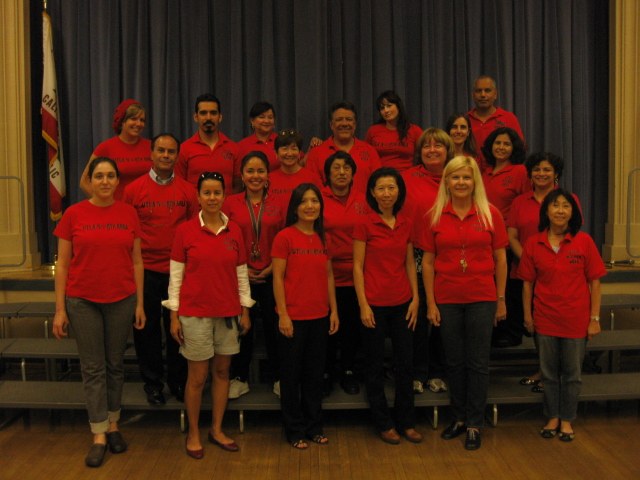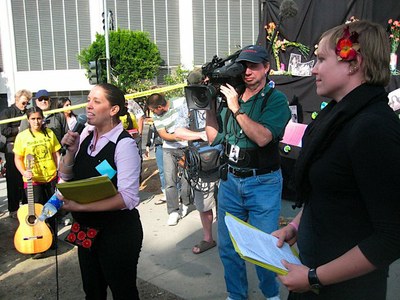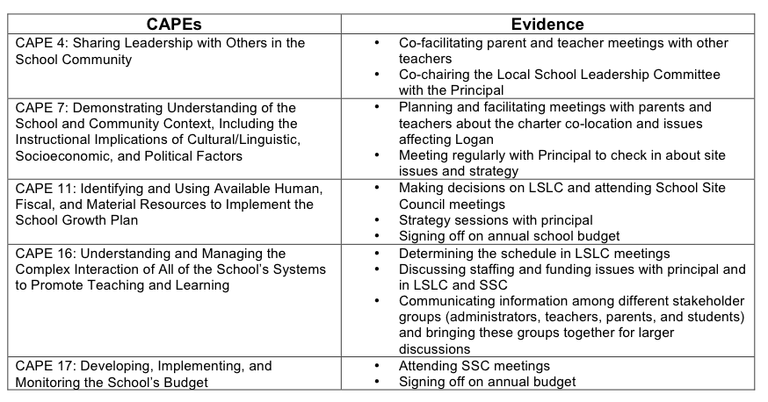Fieldwork Project: UTLA Chapter Chair at Logan Span School
 As the UTLA Chapter Chair at Logan Span School, I co-chaired monthly meetings of the Local School Leadership Council with my principal, I organized monthly UTLA meetings for the Logan staff, I met with the principal each week to discuss school-related issues, and I represented UTLA members at my school site who received unsatisfactory evaluations or were disciplined by the administration. Logan is one of the oldest schools in LAUSD, and it has many unique characteristics (like a charter co-location) that makes the job of the UTLA Chapter Chair quite challenging. I believe that my role as Chapter Chair has helped me to become more diplomatic, and to take into account different stakeholders’ voices.
As the UTLA Chapter Chair at Logan Span School, I co-chaired monthly meetings of the Local School Leadership Council with my principal, I organized monthly UTLA meetings for the Logan staff, I met with the principal each week to discuss school-related issues, and I represented UTLA members at my school site who received unsatisfactory evaluations or were disciplined by the administration. Logan is one of the oldest schools in LAUSD, and it has many unique characteristics (like a charter co-location) that makes the job of the UTLA Chapter Chair quite challenging. I believe that my role as Chapter Chair has helped me to become more diplomatic, and to take into account different stakeholders’ voices.
 At Local School Leadership Council (LSLC) meetings, the contentious relationship with the charter school often comes front-and-center. Because the LSLC oversees the school schedule and scheduling of extracurricular events, we must remember agreements we have made with the charter school and negotiate with the charter school when there is disagreement about shared spaces and scheduling conflicts. As an advocate for Logan, I have fought for Logan to get the entire campus back. During my time at Logan, all of the teachers, administrators, and parents would also like Logan to have access to the whole campus. However, in my opinion, the main reason we have not been able to re-gain use of our whole campus is that the communication among parents, teachers, and administrators has not always been sufficient, and we have been unable to fight against charter co-location in a unified way. During my term on LSLC, I made an issue to talk with parents before and after meetings, to discuss important school issues and find common ground. Historically, parents and teachers took different stands on issues addressed in LSLC about the schedule and how certain funds were spent. However, in my experience, I have seen that it is quite possible to come to consensus on many contentious issues if both sides feel respected and empowered to speak, and are wiling to listen to opposing views. I believe that the climate of the LSLC improved during my term, and much of that had to do with relationship building between teachers and parents.
At Local School Leadership Council (LSLC) meetings, the contentious relationship with the charter school often comes front-and-center. Because the LSLC oversees the school schedule and scheduling of extracurricular events, we must remember agreements we have made with the charter school and negotiate with the charter school when there is disagreement about shared spaces and scheduling conflicts. As an advocate for Logan, I have fought for Logan to get the entire campus back. During my time at Logan, all of the teachers, administrators, and parents would also like Logan to have access to the whole campus. However, in my opinion, the main reason we have not been able to re-gain use of our whole campus is that the communication among parents, teachers, and administrators has not always been sufficient, and we have been unable to fight against charter co-location in a unified way. During my term on LSLC, I made an issue to talk with parents before and after meetings, to discuss important school issues and find common ground. Historically, parents and teachers took different stands on issues addressed in LSLC about the schedule and how certain funds were spent. However, in my experience, I have seen that it is quite possible to come to consensus on many contentious issues if both sides feel respected and empowered to speak, and are wiling to listen to opposing views. I believe that the climate of the LSLC improved during my term, and much of that had to do with relationship building between teachers and parents.
During monthly before-school chapter meetings, I apprised the teachers and staff of “big UTLA issues” (elections, the Schools LA Students Deserve campaign, demonstrations, area meetings), and addressed site-specific issues. For an example of a meeting flyer, click here. One major issue was Breakfast in the Classroom. Many teachers were upset that instructional time was being lost, and that it was difficult to keep classrooms clean and prevent insect- and rodent infestations. The teachers decided to talk with parents about this issue, and we set several after-school meetings to address Breakfast in the Classroom. At first, parents did not understand why teachers disliked the program, but after teachers were given a chance to explain the loss of instructional time and difficulty maintaining cleanliness, the parents began to understand the teachers’ concern. We were able to work out a compromise wherein several grades were able to eat breakfast in outdoor eating areas, and parents would come into classrooms to help facilitate food distribution and clean-up. While the system is still far from ideal, I believe that my conversations and negotiations with parents, teachers, and administration helped to create a better system. The meetings also empowered other teachers and parents to suggest additional meetings about issues such as homework, expectations and discipline.
 Another duty I had as UTLA Chapter Chair was to represent teachers who had filed grievances, received unsatisfactory evaluations, or had been disciplined by the principal. The fact that I have good working relationships with all of the teachers at Logan (and with the administrators) made this process more productive. Often, I was able to talk with the teacher or administrator off-the-record and diffuse situations before grievances were filed or conference memos were written. When a situation called for a formal process, I coached teachers about how to act during the conference, and helped them to write rebuttals to the principal’s allegations. If a situation at a school site escalates past an initial conference, the chapter chair must call a UTLA staff representative to help manage the situation. I am proud to say that, during my time at Logan, we did not have to involve the UTLA staff or District HR for a disciplinary matter; we were able to resolve the issue in-house.
Another duty I had as UTLA Chapter Chair was to represent teachers who had filed grievances, received unsatisfactory evaluations, or had been disciplined by the principal. The fact that I have good working relationships with all of the teachers at Logan (and with the administrators) made this process more productive. Often, I was able to talk with the teacher or administrator off-the-record and diffuse situations before grievances were filed or conference memos were written. When a situation called for a formal process, I coached teachers about how to act during the conference, and helped them to write rebuttals to the principal’s allegations. If a situation at a school site escalates past an initial conference, the chapter chair must call a UTLA staff representative to help manage the situation. I am proud to say that, during my time at Logan, we did not have to involve the UTLA staff or District HR for a disciplinary matter; we were able to resolve the issue in-house.
I believe that the reason that disciplinary issues at Logan did not escalate during my term as Chapter Chair was that I had built trust with the principal and teachers. I spent many hours during my conference period and after school discussing the teachers’ concerns and other site issues with the principal off the record. In this way, the principal was able to make informed decisions and address issues before they became destructive to staff morale. During my time as Chapter Chair, I filed very few official grievances. In fact, I tried to avoid filing grievances whenever possible because I feel that issues can often be resolved in-house with more efficiency when the principal and chapter chair are able to communicate effectively. I have been lucky to have worked with reasonable principals, and though we butted heads from time to time, we were usually able to develop alternatives to formal grievances and disciplinary actions.
In my role as UTLA Chapter Chair, I was able to demonstrate competence in several of the California Administrator Performance Expectations. See the table below for specific CAPEs addressed in this project.
Artifacts


